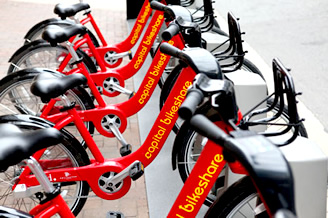Did you know: For the first time in 2008 the world’s city dwellers outnumbered those in the countryside. The share of urbanites is projected to continue increasing, so that by 2030 some 60 percent of the world’s population will live in cities. For more information view the text and data in Chapter 6 of Plan B 4.0: Mobilizing to Save Civilization.
The prevalence of bicycles in a community is an indicator of our ability to provide affordable transportation, lower traffic congestion, reduce air pollution, increase mobility, and provide exercise to the world’s growing population. Bike-sharing programs are one way to get cycles to the masses.
As of September 2014, more than 700 cities in 57 countries host advanced bike-sharing programs, with a combined fleet of close to 800,000 bicycles.
China leads the world with approximately 170 separate bike-share operations. Bike-sharing pioneers Italy and Spain each have programs in close to 130 cities. Germany, France, and the United States follow with around 40 programs each.
Three out of four of the world’s shared bikes are in China, and some of the programs are massive. In Hangzhou, some 78,000 cycles are integrated with bus and subway networks. By 2020 the city’s fleet could grow to 175,000 bikes.
Since the Vélib’ system launched in Paris in 2007, the number of cyclists on the streets has risen 41 percent. Riders can chose among some 20,000 bicycles at more than 1,700 stations in the city and suburbs. Small bikes are now available in some areas, with a helmet, for children.
London’s Barclays Cycle Hire system launched in 2010 with 6,000 bikes and has grown beyond 10,000. New bike lanes and designated cycle tracks have helped ridership grow.
The United States hosts 41 modern bike-sharing programs. With a number of new programs in the works and planned expansions of existing programs, the U.S. fleet is set to nearly double between 2013 and 2015 to over 39,000 publicly shared bicycles nationwide.
Bike-sharing cities are finding that promoting the bicycle as a transport option can lead to more mobility and safer streets for all.
Bike shares, lanes, and other bicycle-friendly infrastructure are a boon to local economies.
With more than half the world’s population now living in cities, there is tremendous potential for municipal governments and urban planners to increase bicycle use.
With annual memberships in most cities well below $100, bike sharing is far cheaper than the $7,800 average cost estimated by AAA to own a car and drive it 10,000 miles a year.
During the first year that people abandon regular driving to become a bike commuter, they can lose 10 pounds or more.
The bike-sharing world is evolving rapidly. To schedule an interview, contact Earth Policy Institute at (202) 496-9290. Data and additional resources available at www.earth-policy.org.
Research Contacts: Janet Larsen, jlarsen (at) earth-policy.org
Updated September 2014


 Print:
Print:  Email
Email